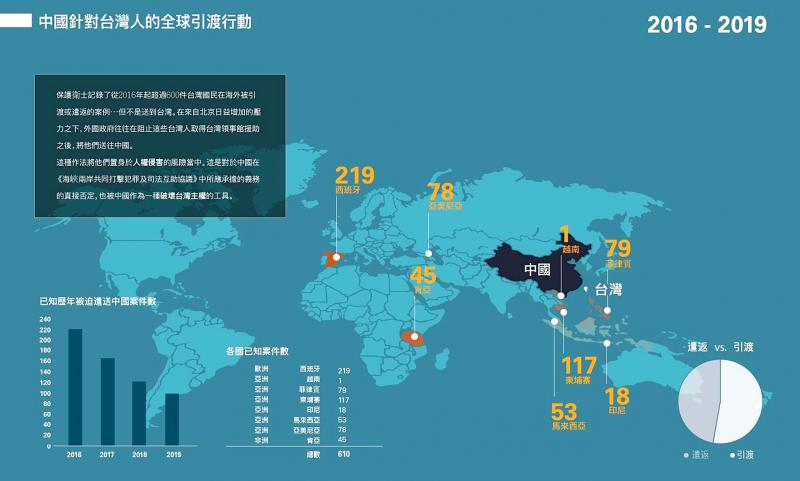About 610 Taiwanese nationals accused of crimes in other countries were extradited to China from 2016 to 2019, international non-governmental organization (NGO) Safeguard Defenders said yesterday, calling on the international community to intervene in the practice.
Based in Madrid, the organization is a human rights NGO founded in late 2016, its Web site says.
It released an eight-page report titled China’s Hunt for Taiwanese Overseas, which compiled data from news reports, government news releases and other sources available to the public.

Screengrab from Safeguard Defenders report.
“Through transnational repression and formal extraditions, the PRC [People’s Republic of China] is pursuing economic fugitives, Uyghur refugees, human rights defenders and fleeing Hong Kongers. But one group that has received far less attention to date: hundreds of Taiwanese nationals have been detained and forcibly extradited to mainland China from around the world,” the group said in a news release yesterday.
From 2016 to 2019, 610 Taiwanese nationals were extradited to China from around the world, including 219 from Spain, 117 from Cambodia and 79 from the Philippines, the report said.
The exact number might be larger, as the group had some difficulty obtaining data from Taiwanese authorities, Safeguard Defenders coordinator and researcher Chen Yen-ting (陳彥廷) told the Taipei Times by telephone.
Most of the extraditions of Taiwanese have taken place over the past five years, the report said.
“In many ways, the case in Kenya is emblematic of this change,” it said.
In 2014, China began pressuring Kenya over a group of more than 70 Chinese and Taiwanese nationals wanted for suspected telecommunications fraud, and in 2016 Kenya agreed to transfer some of them to China, it said.
“At least two of the Taiwanese nationals were later shown delivering televised forced confessions in China,” it said.
Straits Exchange Foundation and China’s Association for Relations across the Taiwan Straits in 2009 signed a Cross-Strait Joint Crime-Fighting and Judicial Mutual Assistance Agreement in which they agreed to cooperate on crime fighting, investigation and collection of evidence, apprehension and repatriation of convicted people, among other areas.
Beijing’s refusal to fulfill its obligations is arguably a response to what it sees as the more pro-independence mentality of President Tsai Ing-wen’s (蔡英文) administration, which came to power in May 2016, the report said.
“The extradition of Taiwanese nationals to China should be seen explicitly as a violation of their rights to a fair trial and to be free from torture,” the report said.
“The international community should take immediate steps to intervene in this practice,” it said. “This opposition doesn’t even have to wade into the politically charged ‘One China’ narratives.”
The global community should also allow Taiwanese representatives to participate in international forums, it said, adding that it is time for Taiwan to join the Interpol.

CHAOS: Iranians took to the streets playing celebratory music after reports of Khamenei’s death on Saturday, while mourners also gathered in Tehran yesterday Iranian Supreme Leader Ayatollah Ali Khamenei was killed in a major attack on Iran launched by Israel and the US, throwing the future of the Islamic republic into doubt and raising the risk of regional instability. Iranian state television and the state-run IRNA news agency announced the 86-year-old’s death early yesterday. US President Donald Trump said it gave Iranians their “greatest chance” to “take back” their country. The announcements came after a joint US and Israeli aerial bombardment that targeted Iranian military and governmental sites. Trump said the “heavy and pinpoint bombing” would continue through the week or as long

TRUST: The KMT said it respected the US’ timing and considerations, and hoped it would continue to honor its commitments to helping Taiwan bolster its defenses and deterrence US President Donald Trump is delaying a multibillion-dollar arms sale to Taiwan to ensure his visit to Beijing is successful, a New York Times report said. The weapons sales package has stalled in the US Department of State, the report said, citing US officials it did not identify. The White House has told agencies not to push forward ahead of Trump’s meeting with Chinese President Xi Jinping (習近平), it said. The two last month held a phone call to discuss trade and geopolitical flashpoints ahead of the summit. Xi raised the Taiwan issue and urged the US to handle arms sales to

A magnitude 5.6 earthquake struck off the coast of Yilan County at 12:37pm today, with clear shaking felt across much of northern Taiwan. There were no immediate reports of damage. The epicenter of the quake was 16.9km east-southeast of Yilan County Hall offshore at a depth of 66.8km, Central Weather Administration (CWA) data showed. The maximum intensity registered at a 4 in Yilan County’s Nanao Township (南澳) on Taiwan’s seven-tier scale. Other parts of Yilan, as well as certain areas of Hualien County, Taipei, New Taipei City, Taoyuan, Hsinchu County, Taichung and Miaoli County, recorded intensities of 3. Residents of Yilan County and Taipei received

Taiwan has secured another breakthrough in fruit exports, with jujubes, dragon fruit and lychees approved for shipment to the EU, the Ministry of Agriculture said yesterday. The Animal and Plant Health Inspection Agency on Thursday received formal notification of the approval from the EU, the ministry said, adding that the decision was expected to expand Taiwanese fruit producers’ access to high-end European markets. Taiwan exported 126 tonnes of lychees last year, valued at US$1.48 million, with Japan accounting for 102 tonnes. Other export destinations included New Zealand, Hong Kong, the US and Australia, ministry data showed. Jujube exports totaled 103 tonnes, valued at